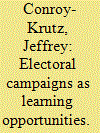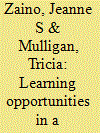|
|
|
Sort Order |
|
|
|
Items / Page
|
|
|
|
|
|
|
| Srl | Item |
| 1 |
ID:
147233


|
|
|
|
|
| Summary/Abstract |
While scholars have studied various aspects of election campaigns, they have not examined their effects on political knowledge in Africa. Since many problems are blamed on information scarcity, campaign-related learning could affect democratic development positively. This article focuses on the case of Uganda, using unique panel data from the 2010–11 campaign. I find that knowledge on office holders, candidates, and institutions increased significantly over the campaign. Importantly, these increases were not concentrated amongst the previously privileged, but also occurred amongst often-disadvantaged groups, such as women, the poor, the less-educated, and rural dwellers. In fact, the campaign seems to have diminished, although not eliminated, pre-existing knowledge gaps between advantaged and disadvantaged populations. It does not appear that Ugandans learned because the campaign made them more excited about politics, but rather because they were exposed to political communications, door-to-door canvassing, and increasingly politicized media content. Finally, knowledge increases are significantly correlated with increased criticism of institutions, but not with increased support for democracy or participation. While we cannot generalize to the rest of the continent, given that interest in a non-competitive campaign like Uganda's might be relatively limited, we might expect similar or larger learning effects in more-democratic settings.
|
|
|
|
|
|
|
|
|
|
|
|
|
|
|
|
| 2 |
ID:
090943


|
|
|
|
|
| Publication |
2009.
|
| Summary/Abstract |
When designed and executed properly, role-playing simulations go a long way to enhance student learning. Typically, however, simulations are divided along subfields. Most exercises, whether based on real or fictitious events, either place students in various roles within a country or have them represent the international interests of one country among others. In an effort to bridge this divide and answer recent calls to internationalize the curriculum, we have designed and implemented a department-wide crisis simulation. The article demonstrates that students engaged in a large-scale, department-wide simulation gain a greater appreciation and understanding of political processes and variables including negotiation, the opportunities and constraints of institutional design, identity, and strategic thinking.
|
|
|
|
|
|
|
|
|
|
|
|
|
|
|
|
|
|
|
|
|